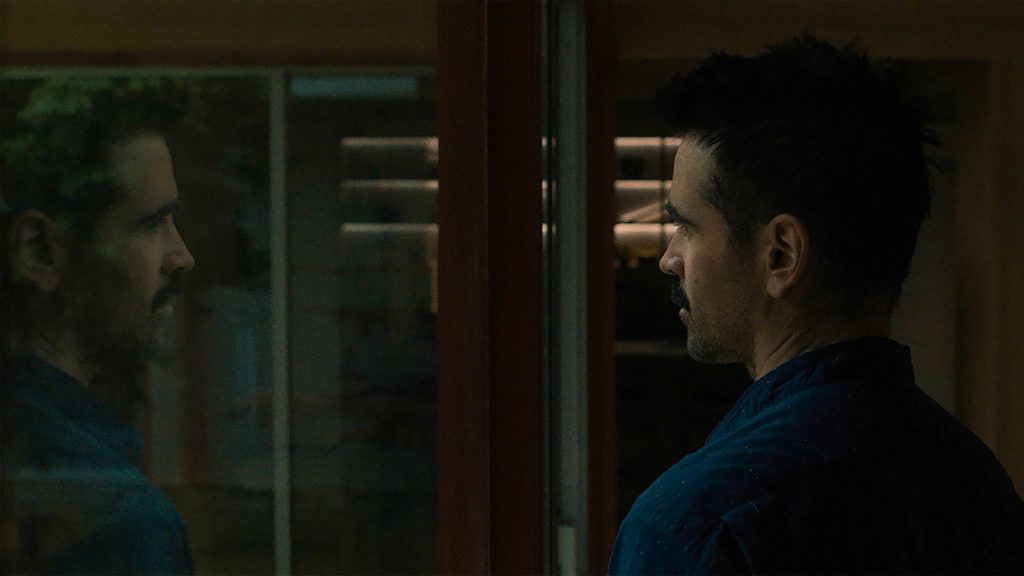After Yang

Colin Farrell appears in AFTER YANG by Kogonada, an official selection of the Spotlight section at the 2022 Sundance Film Festival. Courtesy of Sundance Institute | photo by Benjamin Loeb / A24.
What begins like a commercial for an erectile dysfunction drug evolves into a semi-poignant existentialist drama. Yang (Justin Min) is an artificially-intelligent “technosapien”—not quite an android, but a manufactured, humanoid organism enhanced by cybernetic implants. Wealthy families can afford to buy these A.I.’s as companions or artificial siblings for their children.
Jake (Colin Farrell) and Kyra (Jodie Turner-smith) acquired the “refurbished” Yang from a secondhand dealer to look after their daughter, Mika (Malea Emma Tjandrawidjaja). Clearly, Jake’s foundering business as a tea merchant doesn’t pay the bills in this dramatically-lit, minimalist house. But the movie never explains what Kyra does—she’s always away on business trips, a kind of indie film shorthand for important characters the writer nonetheless felt it unnecessary to flesh out—let alone any number of things that could make this story more relatable to the average person.
Set into motion with a bricked android leading Jake to investigate his memories for clues as to what happened, AFTER YANG wants to plumb the existential depths of identity.
“I guess I’ve acquired a taste for tea, but it’s not why I became interested. I think what I was really drawn to at the beginning was the idea of tea,” explains Jake. Maybe Kogonada was drawn to the idea of being, without wanting to taste it.
At one point, Yang asks, “What makes someone Asian?”
As an Asian, being of Asian origin would be my top answer. But never mind. The fact that most Asians wouldn’t answer similarly is proof positive that we are not monolithic. Is it challenging to present the audience with an artificial being with the knowledge and stereotypical appearance we are taught to think of as uniquely Asian? Would that make Bjørk Asian so long as she were well-versed in the history of the continent and its peoples? What if, instead, the character of Yang were meant to turn the idea of Asian-ness on its head? I’m Asian and I don’t look anything like an Asian, or an Indian for that matter. I’m most frequently mistaken for other nationalities that are as equally unrelated to my biology as my actual nationality.
The personal struggle for identity is mostly about acceptance. In Spielberg’s A.I.: ARTIFICIAL INTELLIGENCE, with which this film invites if not warrants comparison, identity means something because the humans do not accept them. But here we are in a hyper-affluent microcosm that have accepted these advancements in technology—clones and A.I. are quite commonplace. And so, on two fronts it fails the question about being, and specifically about being Asian. There’s no struggle for resources, no signs of massive social inequality. One of the most harmful contemporary stereotypes about Asians, whether South or East, is that we’re all very well off. In fact, income inequality in India and China has never been more staggering.
In scouring Yang’s memory implants, Jake discovers that he’d taken a liking to a girl Ada (Haley Lu Richardson),whom he’d met at a coffee shop. His reason for doing so is problematic, and undermines the film’s thesis. Ada, it turns out, is a clone of the daughter of Yang’s previous owners. Wouldn’t it have been better to have him spontaneously make that choice than for it to be merely a consequence of his programming? Or is the message that we are each only a consequence of our cultural and environmental programming? In this sense, this high concept movie makes the exact same mistake of Chris Columbus’ tonally-disastrous BICENTENNIAL MAN. In Spielberg’s universe, the inability of David (Haley Joel Osment) to think beyond his programming is contrasted on all sides by robots motivated to help him for no other reason than to give meaning to their own existence.